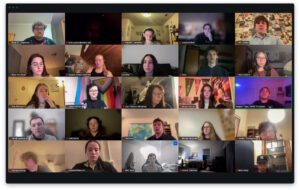It’s 12:10 p.m. on a humid Thursday afternoon in September and the air of The Maine Campus office in the basement of the Memorial Union is filled with the type of music you only hear in two places: on hold and in an elevator.
The call is one worth waiting for. Student newspapers in every state, from Maine to Alaska, were invited to take part in a short conference call with the Democratic nominee for President of the United States, former Secretary of State Hillary Rodham Clinton. The invitation came just a day before the call was set to take place, a casual afternoon chat planned shortly before Secretary Clinton was scheduled to speak at a rally in Charlotte, North Carolina.
When the music finally ends at 12:15 p.m. sharp, there’s a ten minute introduction before the Secretary comes on the line. Two of her aides and a student organizer, all women dedicated to engaging millennial and student voters across the country, gave their background and reasoning for supporting Clinton in her bid for the nation’s highest office.
Millennials — the age group comprised of individuals aged 18 to 35 — were the focus of the call. It’s no wonder. The millennial voting bloc has historically high clout this election, their share of the eligible voting bloc now equivalent to that of the Baby Boomers.
But millennials also suffer from equally low turnout numbers, maxing out at just 50 percent of eligible voters casting a ballot during the 2008 election, according to the Pew Research Center. Baby Boomers, conversely, max out at 69 percent since 1996.
The campaign emphasized the power of millennial voters to change that and with it, the election.
“We know that millennial voters are not only the most diverse and tolerant generation in history,” Kunoor Ojha, Hillary Clinton’s national student organizing director, said. Ojha is also a transplant from Sen. Bernie Sanders’ (I-VT) campaign, one of Clinton’s earliest transfers. “But we’re also an enormous voting block, now. For the first time ever, millennials are going to make up as many voters here as Baby Boomers.”
“First, I really want to say thank you. I started volunteering in presidential campaigns when I was in college,” Clinton said, after introductions were made. The line was silent, save for her. Other callers have to be patched through in order to be heard.
“And I know many of you just returned to campus from busy summers. And it’s remarkable how much you’re already doing,” Clinton continued. “I’ve heard about schools across New Hampshire that’ve added hundreds of students to our SMS list. About impressive voter registration efforts, like the University of Wisconsin-Madison and Appalachian State in North Carolina. Even schools where you’re campaigning with the help of marching bands and taco trucks.”
“And in case you’re wondering, I’d love it if there were taco trucks on every corner!” Clinton added wryly.
Clinton was, of course, referencing the famous gaffe by Trump surrogate Marco Gutierrez earlier in September. Gutierrez is a co-founder of the group “Latinos for Trump” and an important ally for a candidate who has received enormous scrutiny from the Latino community for his staunch stance on immigration.
But it wasn’t all fun and games. Secretary Clinton also touched on two issues that are familiar terrain for her campaign and winning topics for her base: affordable higher education for America’s working class and campaign finance reform.
The former is an issue familiar to a number of the students on the line. When it came time for the question and answer portion of the call, students were quick to ask about just how the nominee planned to address burgeoning college costs.
“How do you plan to make education more affordable, as well as help people who are already in debt due to their education?” Shamika Johnson, a North Carolina college student at a historically black college, asked Clinton.
Clinton emphasized how key education was to not only individual students, but the United States as a whole. Particularly for adults with heavy debt burdens. “That’s why I have a plan to help million of Americans with debt right now, pay it down, pay it off, get out from under it…As President I will push legislation that enables all borrowers to be able to refinance your student loan.”
She also took the opportunity to take a swing at her opponent, Donald Trump, whose own financial history has come under fire. “Look, if Donald Trump can refinance his loan after taking bankruptcies for his companies six times, you deserve to be able to refinance yours. Get a lower interest rate, and get this paid off.”
But for Secretary Clinton, it goes beyond alleviating debt that already exists. She’s looking ahead to prevent crippling debt from occurring in the first place. “I have a plan to college debt-free for future generations,” she said.
Also of concern to Clinton is empowering minority groups, who she has previously warned face unique challenges when looking to further their education.
“And for HBCUs [Historically Black Colleges and Universities] in particular, I’m going to create a dedicated 25 billion dollar fund to invest in these schools and other minority serving institutions. Because they play a key role in helping students of color build the skills that you need,” she told Johnson.










